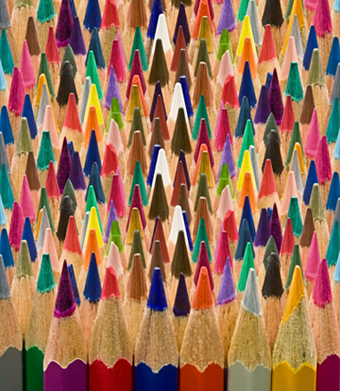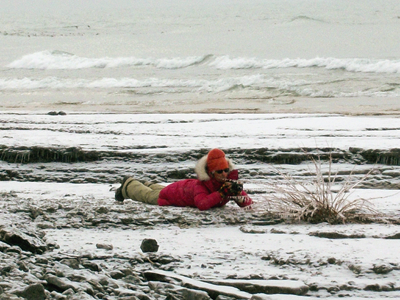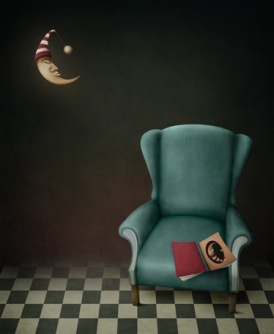The Exquisite Corpse … and Other Writing Exercises for Kids of All Ages
“Playing out loud,” Tania said, “I’d take the kids’ suggestions line by line and we’d write a group poem up on a white board or easel. I see… I hear…Then I’d have them write their own five-senses poems. It’s also fun to use music as a prompt for a free-write. I put together three-minute clips of soprano opera solos, sounds of birds, jazz… I play a clip, have them free write for five minutes, play a clip, write for another five minutes. This helps them step into different moods.”
Here are some of my favorite exercises to use with kids:
1. The 5 x 5: Kids suggest five colors, five feelings (cold, hot, and other sensory feelings), five places in the house, five animals, five foods. You write all of those on the board, white board, or a large piece of paper. They then choose one word from each list and write a poem. I learned this one from poet and teacher Brendan Constantine.
2. List poem: I wish I could… If I had a house… I am going to… Each line of the poem starts with one of these phrases.
3. Become a thing: Ask kids to imagine themselves as an inanimate object: car, building, wind, ocean, food processor, carpet, pillow, iPad, window. Have them write an eight-line poem about that experience.
4. Exquisite corpse: This is a collaborative literary game that can be used by a group to develop a poem. Someone writes a line of poetry/a phrase/a sentence on a piece of paper, passes the paper on to the next person, who writes another line, then folds the paper to hide the first person’s line and passes it on until everyone has added a line. Each person must read only the last line before writing their own so that there’s some (vague) attempt at continuity. You could establish other guidelines, such as a topic or a type of word—noun, verb, adverb—that each person can contribute. Poets.org offers some guidelines. And here’s a post on how one language-arts teacher uses this method in the classroom.
The same game can be used to create stories. Check out The Exquisite Corpse Adventure at the Library of Congress, which includes contributions from M. T. Anderson, Kate DiCamillo, Lemony Snicket, and many other great children’s book authors.
5. In twos: Give the kids a list of topics (our school, our local swimming pool, our grocery store, our math class) and have them write alternate lines for the poem. It doesn’t matter if the “our” isn’t exactly the same for each kid. For example, you might pair an older kid with a younger kid; they may attend different classes and live in different neighborhoods; the results will be fascinating!
6. Stand up and jump: Have the kids do jumping jacks, holding chair position, running on the spot faster and faster and then stopping and being completely still. This gets their energy going in all the right directions. You might stop part-way through your writing exercises and have them jump again. Stand still. Close their eyes. What can they hear, feel, smell?
7. Gift poem: This is a possible closing exercise. You’ll need small, white party favor boxes, scrap paper (old sheet music pages work great), pencils, and colored pencils.
Throughout the week, the kids will have got to know each other a little. Have them sit in a circle or around a table. Ask them to think about the person sitting to their right or left. Do they know each other’s name? School? Neighborhood? And so on. Ask them to write a wish for that person—something that will be really amazing to open. This is the poem part of the exercise. Have them write their poems quickly.
This time they won’t share their own poems. They’ll fold them up and put them in the boxes. Then they’ll decorate the boxes with the colored pencils. You could also have them write on the box the time and date when it is to be opened by the recipient. Then they’ll give the boxes to each other.
I recommend mixing up the ages. Having contrasting perspectives is exciting! It also encourages the more nurturing side in the older kids and is exciting for the young ones to work with someone older.
An option: They might open their boxes at the end of the class, then everyone will get to read their gift poem aloud!
Sandra Hunter has been running writing and performance workshops and retreats in the Los Angeles and Ventura areas for more than ten years. Her fiction has appeared in a number of literary magazines and won the 2012 Cobalt Fiction Prize, the 2011 Arthur Edelstein Short Fiction Prize, finalist awards from Black Warrior Review, Zoetrope All-Story, Lightship, UNO Study Abroad Program, and the Katherine Ann Porter Fiction Prize. Her novel Losing Touch will be published by Oneworld Publications in 2014.Recently she started exploring dimensions in language with a series of text and digital photograph pieces that have been, or will be, exhibited in California, Illinois, Wisconsin, Italy, and online. One of her pieces won a special merit award in the 2013 Northern National Art Competition.
Many thanks to Sandra Hunter for contributing this guest post. You can read her fiction in Carve Magazine and in White Whale Review. She’s a fabulous writer! For more creative prompts read my post “Jump-Start Your Writing with Word Play.”–Barbara
What are your favorite writing exercises to use in groups, with kids or adults? How did Sandra Hunter’s exercises work for you?




Thanks for posting this Barbara–I love Sandra’s diverse exercises…what a resource you have given us all here. What an amazing time to be a writer, with so much active sharing and collaboration across all kinds of former lines and/or boundaries.